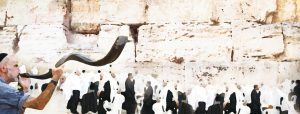Some have wondered why, if Jesus’ life was a perfect sacrifice, Jesus didn’t die on Yom Kippur instead of Passover. During the first decades after the resurrection, when the early Christian community was primarily Jewish, believers continued to participate in Yom Kippur and the rest of the yearly festival cycle, though their understanding of those rituals took on new meaning as they reveled in the fulfillment of Jesus’ sacrifice for them. Many of the church’s early leaders taught about Jesus as simultaneously high priest, scapegoat and perfect sacrifice. The source material for this teaching tended to be the events of Holy Week.
But while early church leaders continued to teach Jesus’ fulfillment of Yom Kippur’s purpose, there was a movement among Gentile believers away from adapting Yom Kippur as a holy day for the church. Scholar Daniel Stoekl Ben Ezra wrote, “Yom Kippur was for Gentile Christians not so much a custom to be continued as a festival to be newly adopted—a process possible only where the new custom could be supported by a Christian rationale. Since Christ died in Nisan (during Passover) and not in Tishri (during Yom Kippur), the main meaningful events of earliest Christianity were connected to a different month.”[1]

In any case, while Yom Kippur is a central event in the Jewish calendar, the exodus is the essential narrative of the Jewish people. Jesus’ perfect sacrifice at Passover fulfilled the once-a-year reckoning of sin at Yom Kippur and the everyday reality of sin at work in each one of our lives.
Does Yom Kippur have meaning for those seeking to follow Jesus today? Yes. Yom Kippur allows us to reflect on the immeasurable grace of God found in our Messiah Jesus. Instead of apprehension about whether we’ll be inscribed in the Book of Life from year to year, Jesus’ followers can embrace his fulfillment of this day with deep gratitude.
Many Messianic Jews choose to fast on Yom Kippur as a way to both stand in solidarity with and intercede in prayer for their not-yet-believing Jewish friends and family. Followers of Jesus understand that fasting is not a transaction that demonstrates how serious a person is about repenting from sin; fasting is a spiritual discipline that allows us to focus our desires on God.
If you’d like to consider the meaning of Yom Kippur more fully, consider prayerfully reflecting on the words of Isaiah 58. How did Jesus’ life and ministry reflect this kind of fast? What kind of fast might God be calling you to do?
You may wish to seek out some hymns or worship songs that focus on the atonement. “There Is a Redeemer” (Melody Green), “And Can It Be?” (Wesley/Campbell), and “O Sacred Head Now Wounded” (Bernard of Clairvaux) can get you started.
If you gather with others on Yom Kippur, thank God together for the once-and-for-all salvation he’s given you in Jesus the Messiah. He has inscribed your name on the palms of his hands (Isaiah 49:16) and written it in his Book of Life (Revelation 21:27).
- [1] Daniel Stoekl Ben Ezra, The Impact of Yom Kippur on Early Christianity: The Day of Atonement from the Second Temple to the Fifth Century, Wissenschaftliche Untersuchungen zum Neuen Testament 163 (Tubingen: Mohr-Siebeck, 2003), 331.
By Michelle Van Loon
Adapted from Moments & Days: How Our Holy Celebrations Shape Our Faith (NavPress, 2015). For more information about the book, visit MomentsAndDays.org